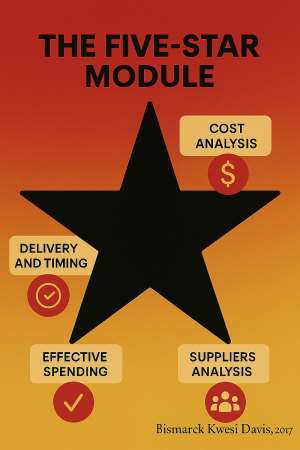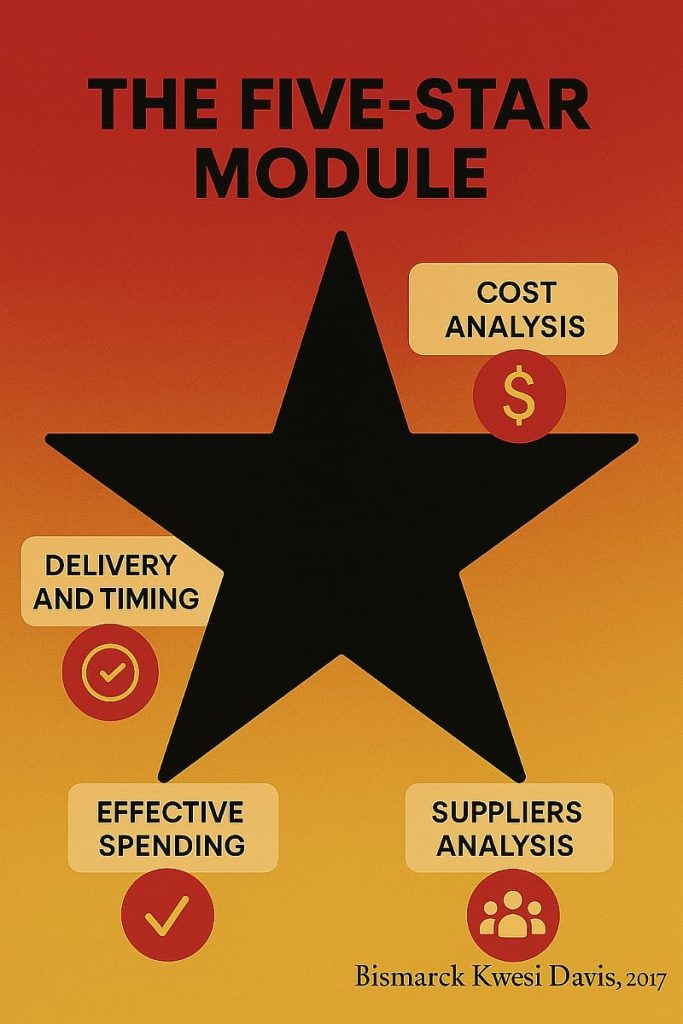 Five-Star Strategic Procurement Model
Five-Star Strategic Procurement Model“True wealth begins when a nation stops bleeding in silence and starts auditing with courage.” — Bismarck Kwesi Davis
Abstract
Public procurement, accounting for 15–18% of Ghana’s GDP, is a critical lever for economic transformation. Yet, inefficiencies, corruption, and political interference have turned this strategic tool into a source of fiscal leakage. This article explores how data-driven procurement reforms, anchored in the Ghana Electronic Procurement System (GHANEPS) and strengthened Public Procurement Authority (PPA) oversight, can convert wastage into wealth. Using Harvard-style economic frameworks—such as Total Cost of Ownership (TCO), Principal-Agent Theory, and Game Theory—we analyze systemic inefficiencies and propose actionable reforms. With global benchmarks from Rwanda, South Korea, and Estonia, we argue that Ghana can transform procurement into a catalyst for fiscal discipline, job creation, and sustainable growth.
1.0 General Overview
Procurement is not merely a transactional process; it is a strategic economic instrument that shapes fiscal health and national development. In Ghana, where public procurement constitutes 15–18% of GDP, every purchasing decision carries profound economic implications. Mismanaged procurement fuels inflation, erodes public trust, and diverts resources from critical sectors like healthcare and infrastructure. Conversely, strategic procurement, grounded in data analytics and transparency, can drive value creation, foster innovation, and rebuild economies. As Bismarck Kwesi Davis noted in 2017, “Value is the function of cost” (Davis, 2017). This article examines how Ghana can harness data-driven procurement and PPA reforms to transition from wastage to wealth.
1.1 Procurement as an Economic Lever
In resource-constrained economies like Ghana, procurement is a double-edged sword. When aligned with national priorities, it catalyzes growth; when misused, it becomes a liability. Ghana’s economic challenges—high public debt (79% of GDP in 2024), inflation (23.1%), and currency depreciation—demand a procurement system that maximizes value and minimizes waste (World Bank, 2024). The Public Procurement Authority (PPA), established under the Public Procurement Act of 2003 (Act 663, amended by Act 914 in 2016), is tasked with ensuring transparency, accountability, and value for money. Yet, systemic inefficiencies, including political interference and low adoption of GHANEPS, undermine its efficacy (PPA, 2024).
Procurement analysis—the systematic evaluation of purchasing activities—offers a solution. By leveraging data analytics, Ghana can optimize costs, enhance supplier resilience, and align procurement with sustainable development goals (SDGs). This article employs Harvard-style economic models to analyze Ghana’s procurement challenges and proposes reforms with global appeal, drawing on best practices from Rwanda, South Korea, and Estonia.
1.2 Economic Models for Procurement Reform
Total Cost of Ownership (TCO): TCO quantifies the full lifecycle costs of procurement, including acquisition, operation, maintenance, and disposal. By adopting TCO, Ghana can avoid the trap of selecting low-cost but high-maintenance suppliers, ensuring long-term fiscal savings.
Principal-Agent Theory: This model addresses misaligned incentives between procurement officials (agents) and the public (principal). Political interference and corruption often stem from agents prioritizing personal or political gains over public welfare. Transparent systems like GHANEPS can align incentives by reducing discretionary power.
Game Theory: Procurement involves multiple stakeholders—government, suppliers, and civil society—whose interactions resemble a non-cooperative game. Strategic reforms, such as mandatory competitive tendering, can shift the equilibrium toward transparency and efficiency, minimizing cartel formation and rent-seeking.
These models provide a rigorous framework to diagnose inefficiencies and design reforms that resonate globally.
2.0 A Data-Driven Procurement Framework
To operationalize procurement reforms, we propose a refined “Five-Star Module” that integrates data analytics and global best practices. Each component addresses a critical aspect of procurement efficiency.
2.1 Cost Analysis
Procurement costs extend beyond purchase prices to include transportation, storage, and obsolescence. In 2023, Ghana’s PPA reviewed GH₵17.3 billion in contracts, but only 40% met value-for-money benchmarks, indicating significant hidden costs (PPA, 2023). Adopting TCO can reveal these costs. For example, Rwanda’s e-procurement system, Umucyo, uses TCO to evaluate supplier bids, reducing lifecycle costs by 12% annually (Rwanda Public Procurement Authority, 2023). Ghana can emulate this by mandating TCO analysis in GHANEPS evaluations.
2.2 Inventory Analysis
Inventory mismanagement is a silent drain on Ghana’s resources. Public warehouses often hold obsolete stock, with holding costs estimated at 5–10% of inventory value annually (IMANI Ghana, 2023). Just-in-Time (JIT) principles, as implemented in South Korea’s KONEPS platform, can minimize waste by aligning procurement with demand. For instance, South Korea reduced inventory costs by 15% through real-time demand forecasting (Korea Public Procurement Service, 2024). Ghana’s PPA should integrate JIT analytics into GHANEPS to optimize inventory flows.
2.3 Supplier Analysis
Overreliance on single suppliers creates systemic risks, as seen in Ghana’s health sector during COVID-19, where 30% of emergency contracts were sole-sourced (IMANI Ghana, 2023). Diversifying the supply base while consolidating orders enhances resilience. Estonia’s e-procurement platform, using blockchain for supplier vetting, reduced cartel formation by 20% (Estonian Ministry of Finance, 2024). Ghana can adopt similar blockchain-based supplier registries to ensure competitive and transparent sourcing.
2.4 Effective Spending
Maverick spending—unplanned, unvetted purchases—costs Ghana an estimated $3 billion annually due to procurement-related corruption (Ghana Anti-Corruption Coalition, 2020). Spend analysis, supported by AI-driven audits, can plug these leakages. For example, Singapore’s GeBIZ platform uses AI to flag irregular spending patterns, saving $500 million annually (Singapore Public Service Division, 2024). Ghana’s PPA should deploy AI tools within GHANEPS to enforce spending discipline.
2.5 Delivery and Timing
Late deliveries, particularly in healthcare and agriculture, compromise budgets and lives. In 2022, delayed medical supplies led to a 15% increase in hospital operational costs (Ministry of Health, 2023). Data-driven logistics, as seen in South Korea’s real-time tracking systems, can ensure timely delivery. Ghana’s PPA should integrate GPS-enabled tracking and smart contracts into GHANEPS to align deliveries with cash flow cycles and project timelines.
3.0 Ghana’s PPA and the Quest for Value
Ghana’s PPA is at a crossroads. While GHANEPS, launched in 2018 with World Bank support, has onboarded 856 procurement entities as of April 2024, systemic challenges persist (PPA, 2024). Key issues include:
Low Value-for-Money Compliance: Only 40% of GH₵17.3 billion in contracts reviewed in 2023 met value-for-money standards, indicating inefficiencies in cost and quality assessments (PPA, 2023). Political Interference: 23% of contracts bypassed competitive tendering, often justified as “emergencies” (PPA, 2023). A CHRAJ investigation into the former PPA CEO revealed GH₵5.7 million in losses due to inflated pricing and lack of transparency (CHRAJ, 2021). Limited GHANEPS Adoption: Only 58 of 261 Metropolitan, Municipal, and District Assemblies (MMDAs) are fully integrated into GHANEPS, hindering nationwide transparency (PPA, 2024). Fiscal Recklessness: IMANI Africa’s 2021–2023 Fiscal Recklessness Index identified the Ministry of Finance as the most fiscally reckless institution, with 90% of financial irregularities linked to procurement (IMANI Africa, 2024).
These challenges reflect a principal-agent problem, where procurement officials prioritize political or personal interests over public welfare. Game-theoretic interventions, such as mandatory competitive tendering and public disclosure of contracts, can shift incentives toward transparency.
3.1 Global Benchmarks
Ghana can draw inspiration from global leaders in procurement reform:
Rwanda: The Umucyo e-procurement system ensures 100% competitive tendering, reducing corruption by 25% since 2015 (Rwanda Public Procurement Authority, 2023). Rwanda’s success stems from strict enforcement and whistleblower protections, which Ghana’s PPA should emulate. South Korea: The KONEPS platform integrates AI and real-time analytics, saving $8 billion annually through efficient procurement (Korea Public Procurement Service, 2024). Ghana can adopt similar AI tools to enhance GHANEPS. Estonia: Blockchain-based procurement ensures tamper-proof records, boosting public trust and reducing fraud by 20% (Estonian Ministry of Finance, 2024). Ghana’s PPA should explore blockchain to secure GHANEPS data.
3.2 Proposed Reforms
To transform procurement into a national growth engine, Ghana must implement the following reforms:
Full GHANEPS Integration: Mandate all 261 MMDAs to adopt GHANEPS by Q4 2025, supported by nationwide training for 10,000 procurement officers (PPA, 2024). AI and Blockchain Integration: Deploy AI for spend analysis and blockchain for supplier vetting to enhance transparency and reduce fraud. Legislative Amendments: Amend Acts 663 and 914 to limit sole sourcing to genuine emergencies and enforce public disclosure of all contracts (MyJoyOnline, 2025). Whistleblower Protections: Enact robust legislation to protect whistleblowers, encouraging reporting of corruption (Ghana Anti-Corruption Coalition, 2020). Fiscal Discipline: Integrate procurement approvals with the Ghana Integrated Financial Management Information System (GIFMIS) to align spending with budget allocations (Ministry of Finance, 2022).
These reforms align with Ghana’s Vision 2057, which aims for upper-middle-income status by 2057, and the IMF-supported Post-COVID-19 Programme for Economic Growth (PC-PEG), targeting 5% GDP growth by 2025 (NDPC, 2024; Ministry of Finance, 2024).
4.0 From Leakage to Growth
Strategic procurement can yield transformative economic benefits:
Fiscal Savings: Rwanda’s procurement reforms saved 12% of public expenditure, equivalent to $300 million annually (Rwanda Public Procurement Authority, 2023). Ghana could save $1–2 billion annually by curbing maverick spending and corruption. Job Creation: Transparent procurement encourages SME participation, creating jobs. South Korea’s KONEPS increased SME contracts by 30%, generating 100,000 jobs (Korea Public Procurement Service, 2024). Ghana could create 50,000–100,000 jobs by prioritizing local suppliers. Inflation Control: Efficient procurement reduces cost-push inflation by ensuring timely delivery of goods. Estonia’s e-procurement system lowered public sector inflation by 2% annually (Estonian Ministry of Finance, 2024). Debt Sustainability: By aligning spending with budgets, procurement reforms support Ghana’s debt restructuring, reducing the debt-to-GDP ratio from 79% in 2024 to 70% by 2027 (World Bank, 2024).
These outcomes position procurement as a cornerstone of Ghana’s economic recovery and global competitiveness.
5.0 Summary
Ghana stands at an economic crossroads. With public debt at 79% of GDP and inflation at 23.1%, strategic procurement is not a luxury but a necessity. By fully operationalizing GHANEPS, enforcing the Public Procurement Act, and adopting global best practices, Ghana can transform procurement from a leakage point into a national growth engine. The Five-Star Module—cost analysis, inventory optimization, supplier resilience, spending discipline, and timely delivery—provides a roadmap for reform. Harvard-style economic models, including TCO, Principal-Agent Theory, and Game Theory, underscore the urgency of aligning incentives and enforcing transparency.
“Public procurement is not paperwork. It’s a national security tool in economic disguise.” — Bismarck Kwesi Davis
6.0 Procurement as the Conscience of a Nation
In a nation yearning for fiscal rebirth, procurement must embody the conscience of governance. Every cedi spent must reflect Ghana’s aspirations for prosperity, equity, and resilience. By shifting from sole-sourcing shortcuts to competitive tendering, from political interference to data-driven accountability, Ghana can reimagine procurement as the heartbeat of its transformation. As Bismarck Kwesi Davis aptly stated, “A nation that mismanages its purchasing power shall always be a borrower, never a builder.” Let us build a Ghana where procurement fuels wealth, not wastage, and every cedi invested returns value to its people.
References
CHRAJ. (2021). Investigative Report on the Former PPA CEO. Accra: Commission on Human Rights and Administrative Justice.
Davis, B. K. (2017). Value is the Function of Cost. Accra: Methodist University College Ghana.
Ghana Anti-Corruption Coalition. (2020). Procurement-Related Corruption in Ghana: A $3 Billion Annual Loss. Accra: GACC.
IMANI Ghana. (2023). Value for Money in Emergency Health Procurement in Ghana: A Review of COVID-19 Expenditures. Accra: IMANI Center for Policy and Education.
IMANI Africa. (2024). 2021–2023 Fiscal Recklessness Index Report. Accra: IMANI Africa.
Korea Public Procurement Service. (2024). KONEPS Annual Report 2024. Seoul: KPPS.
Ministry of Finance. (2022). Public Financial Management and Procurement Planning Guidelines. Accra: MoF.
Ministry of Finance. (2024). Ghana Achieves Remarkable Economic Recovery Amid Global Challenges. Accra: MoF.
MyJoyOnline. (2025). Public Procurement and Corruption in Ghana: Challenges and Sustainable Solutions.
National Development Planning Commission (NDPC). (2024). Ghana’s Vision 2057: A Long-Term Development Framework. Accra: NDPC.
Public Procurement Authority. (2023). Annual Performance Report. Accra: PPA Ghana.
Public Procurement Authority. (2024). GHANEPS Progress Report, Q1 2024. Accra: PPA Ghana.
Rwanda Public Procurement Authority. (2023). Umucyo E-Procurement System: Impact Assessment 2023. Kigali: RPPA.
Singapore Public Service Division. (2024). GeBIZ Platform: Efficiency and Transparency in Procurement. Singapore: PSD.
World Bank. (2024). Ghana’s Economic Prospects on Track Amid Reforms. Washington, DC: World Bank.


